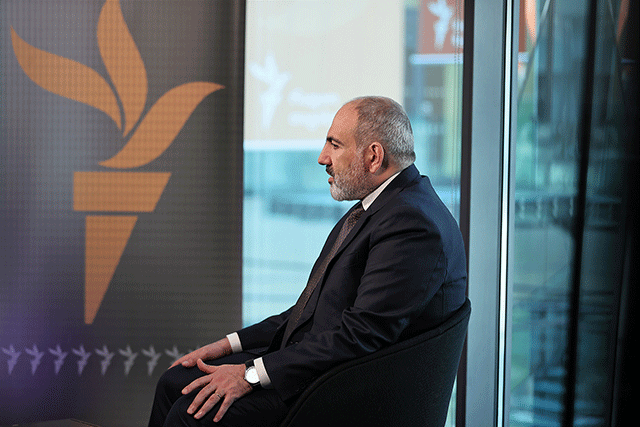Pashinyan Points Out Differences Over Wording In Draft Armenia-Azerbaijan Peace Agreement After Washington Talks
Azatutyun.am. Armenian Prime Minister Nikol Pashinyan still sees a “huge difference” between Armenia and Azerbaijan in regards to the wording in the draft peace agreement despite reported progress in their marathon bilateral talks hosted by the United States this week.
Armenian Foreign Minister Ararat Mirzoyan and his Azerbaijan counterpart Jeyhun Bayramov held the negotiations for four days on May 1-4, with U.S. Secretary of State Antony Blinken joining them in opening and closing sessions in Washington.
A joint statement issued by the parties after the talks said Mirzoyan and Bayramov and their teams “made progress in mutual understanding on some articles of the draft bilateral Agreement on Peace and Establishment of Interstate Relations”, but noted that positions on a number of key issues remain different.
Read also
Blinken sounded optimistic after “intensive and constructive” talks, proposing the ministers return to their capitals “to share with their governments the perspective that, with additional goodwill, flexibility, and compromise, an agreement is within reach.”
In an exclusive interview with RFE/RL’s Armenian Service on Friday, Pashinyan, who was on a two-day official visit to Prague, said that the key differences concerned not only Nagorno-Karabakh.
He said that despite agreements reached by the leaders of Armenia and Azerbaijan at their meetings in Prague and Sochi in October last year that both countries recognize each other’s territorial integrity, “we are still unable to reach agreement in the draft peace agreement on the wording that will give us confidence that Azerbaijan recognizes 29,800 square kilometers of Armenia [within its Soviet-era borders].”
Pashinyan also highlighted the need for guarantees as, he said, “any agreement, even the most unambiguously written one, allows for interpretations.”
“How should these [different] interpretations be resolved? Eventually, guaranteeing peace after the signing of the peace agreement is a very important issue,” the Armenian premier said.
He said that both international and local mechanisms should be applied in such matters as the withdrawal of troops and establishment of a demilitarized zone.
Pashinyan said that there are also different interpretations in Yerevan and Baku on how to address the rights of Nagorno-Karabakh’s Armenians.
“Of course, there is certain progress. While the difference between the sides was 1 kilometer before, now it is 990 meters. It is progress, but there is still a huge difference,” he said.
Pashinyan reiterated Armenia’s position that the issue of the rights and security of Nagorno-Karabakh’s Armenians should be discussed in a dialogue between Baku and Stepanakert that will have a certain international engagement. “Otherwise, this topic and agenda can simply be forgotten by Azerbaijan,” he said.
Pashinyan said that the discussion that started in Washington this week can continue in Moscow, denying claims that there are “Western” and “Russian” drafts that differ from each other.
“Sometimes I read articles, listen to interviews as I want to understand what people are talking about. If I weren’t prime minister, I would have thought that there was something I didn’t know,” said Pashinyan.
He said that while there have been some approaches from the West, they have not been presented as an option in writing. “The approach is verbal, and if we put it down and read it on paper, it may turn out that we understood it wrong, that it is not like that.
In August 2022, the Russian side submitted a written proposal, we accepted it, Azerbaijan rejected it. We haven’t seen Russia putting that option on the table for a second time,” Pashinyan said.
Armenia and Azerbaijan have been locked in a conflict over Nagorno-Karabakh for decades. Some 30,000 people were killed in a war in the early 1990s that left ethnic Armenians in control of the predominantly Armenian-populated region and seven adjacent districts of Azerbaijan proper.
Decades of internationally mediated talks failed to result in a diplomatic solution and the simmering conflict led to another war in 2020 in which nearly 7,000 soldiers were killed on both sides.
The six-week war in which Azerbaijan regained all of the Armenian-controlled areas outside of Nagorno-Karabakh as well as chunks of territory inside the Soviet-era autonomous oblast proper ended with a Russia-brokered ceasefire under which Moscow deployed about 2,000 troops to the region to serve as peacekeepers.
Tensions along the restive Armenian-Azerbaijani border and around Nagorno-Karabakh leading to sporadic fighting and loss of life have persisted despite the ceasefire.
They flared anew last month when Azerbaijan installed a road checkpoint at the start of the Lachin Corridor, the only route linking Armenia to Nagorno-Karabakh.
Armenia says the checkpoint, set up on April 23, is a violation of the 2020 ceasefire. Azerbaijan insists it established the checkpoint in response to what it says were Armenian military supplies to Nagorno-Karabakh. Armenia denies that accusation.




















































